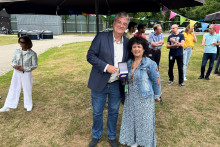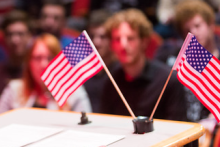Globalisation of higher education, and therefore competition, forces the UT to characterise itself clearly on the world market. Rector Frans van Vught said this in his speech on the occasion of the opening of the academic year.
'The competition between universities is becoming like an arms race', says Van Vught. 'They are fighting each other increasingly fanatically for the best students, the best staff, the most research funds, the highest prestige.' As an example he mentions the United States where universities 'buy' students with scholarships and thus only admit the best to keep up their academic prestige.
Van Vught predicts that this world-wide arms race will grow even further. Education offers more and more diversity. Increasingly companies have their own university, Heineken for example. For-profit-institutes more and more offer courses, like MBAs. Courses on offer on the web are increasing too. Students desire technological support in their learning processes and will select on that basis. Finally, higher education is globalising, some universities already have a world-wide virtual programme and consider the whole world their market. Escaping this is impossible, Van Vught predicts. 'It would be naive to think that these changes will pass the Netherlands by.' Van Vught says. 'It is no use to entrench ourselves in academic bastions, with a nostalgic desire to the elite-universities of yesteryear. This university does not want that. We analyse the international developments and try to base our strategy on that.'
A strategy, that is the point. Because of the developments in higher education Dutch universities have to think about which attitude they wish to adopt. Van Vught: 'In our mission we call ourselves an enterpreneurial research university.' By that the UT wants to indicate that fundamental research and academic development have important roles to play in Twente, but also that practical relevance is placed high on the agenda. 'We are still the enterpreneurial university and aim to prove our social relevance through our academic enterpreneurship. That is where we seek our definition of prestige.'







